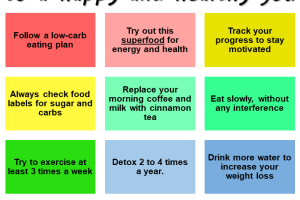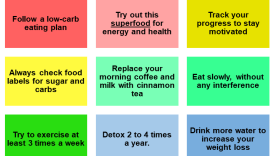Embracing a Healthy Lifestyle: A Beginner’s Guide

In today’s fast-paced world, maintaining a healthy lifestyle can often feel overwhelming. Many individuals struggle to find the time and motivation to prioritize their health amidst daily responsibilities and commitments. However, embracing a holistic approach to wellness is not just about physical fitness; it’s a multifaceted journey that encompasses nutrition, mental well-being, and self-care.
- Embracing a Healthy Lifestyle: A Beginner’s Guide
- Why This Matters
- Understanding the Importance of a Healthy Lifestyle
- The Ripple Effects of Healthy Living
- Assessing Your Current Health Status
- Physical Health Assessment
- Mental Health Assessment
- Setting Realistic Health Goals
- SMART Goals Approach
- Nutrition Tips for Beginners
- Importance of a Balanced Diet
- Easy Meal Planning Strategies
- Incorporating Regular Exercise into Your Routine
- Finding Activities You Enjoy
- Creating a Balanced Routine
- Importance of Proper Hydration
- Why Hydration Matters
- How to Stay Hydrated
- Getting Adequate Sleep for Better Health
- The Benefits of Adequate Sleep
- Tips for Better Sleep Quality
- Managing Stress and Prioritizing Self-Care
- The Impact of Stress on Health
- Self-Care Strategies for a Balanced Life
- Building a Support System for Accountability
- The Value of Community
- Strategies to Build Your Support System** Here are some practical ways to create your accountability network: - **Join Local Classes or Groups**: Participate in fitness classes or workshops where you can meet others with similar interests. - **Utilize Social Media**: Follow fitness-related accounts or join online forums to connect with a broader community. - **Set Up Regular Check-Ins**: Schedule weekly calls or meet-ups with a friend to discuss your progress and challenges. By fostering a supportive environment, you'll not only enhance your chances of success but also enjoy the journey toward a healthier lifestyle. Next, we will explore different forms of physical activity to add variety and excitement to your exercise routine.
- Exploring Different Forms of Physical Activity
- The Benefits of Physical Activity Variety
- Types of Physical Activities to Explore** Consider incorporating the following activities into your regimen: - **Dance**: Zumba, hip-hop, or ballet can be fun ways to get moving. - **Strength Training**: Experiment with free weights, resistance bands, or bodyweight exercises to boost strength. - **Outdoor Activities**: Hiking, kayaking, or cycling can infuse nature into your fitness routine. By diversifying your physical activities, you’ll not only keep your workouts engaging but also enhance your overall fitness journey. In the next section, we will discuss tips for maintaining consistency on your path toward a healthier lifestyle.
- Tips for Maintaining Consistency in Your Healthy Lifestyle Journey
- The Power of Habit Formation
- Staying Motivated and Engaged** Here are additional strategies to keep yourself motivated: - **Reward Yourself**: Celebrate milestones, no matter how small. Treat yourself to new workout gear or a relaxing spa day. - **Mix It Up**: Regularly alternate your workout routines to prevent boredom. - **Connect with Your Support System**: Share your progress and challenges with friends or fitness groups to stay inspired. By integrating these tips into your daily routine, you’ll be better equipped to navigate any obstacles while enjoying the benefits of a healthy lifestyle. Next, we’ll explore the significance of celebrating your progress and milestones throughout this journey.
- Celebrating Your Progress and Milestones
- The Importance of Recognition
- Ways to Celebrate Your Success** Here are some engaging ideas to mark your health milestones: - **Share Your Journey**: Post updates on social media or with your support group to inspire others and yourself. - **Plan a Celebration Event**: Organize a gathering with family and friends to share your achievements and enjoy healthy foods together. - **Set New Goals**: Use your milestones as a springboard to set new, more ambitious objectives for continued growth. By celebrating your accomplishments, you’ll not only enhance your enjoyment of this journey but also motivate yourself to keep moving forward. Next, we will discuss the importance of seeking professional guidance and support to further enhance your progress.
- Seeking Professional Guidance and Support
- The Benefits of Professional Guidance
- Finding the Right Support** Here are some ways to access professional help: - **Personal Trainers**: Hire a trainer to guide you through workouts and adjust your program as needed. - **Nutritionists/Dietitians**: Consult with a nutrition expert to map out a balanced eating plan tailored to your goals. - **Health Coaches**: Consider working with a coach who can help you identify obstacles and bolster your motivation. By seeking professional support, you create a robust framework for your health journey, equipping yourself with the knowledge and tools necessary for sustained success. In the final section, we will wrap up with some encouraging thoughts and final encouragement to keep you inspired on your path to wellness.
- Final Thoughts and Encouragement
- Embracing the Journey
Why This Matters
Creating a comprehensive health plan is essential for achieving long-term well-being. Here are a few reasons why this journey is significant:
- Prevention of chronic diseases: A balanced approach can reduce the risk of conditions like diabetes, heart disease, and obesity.
- Improving mental health: Healthy habits contribute to better mood and stress management.
- Enhancing overall quality of life: Feeling great physically and mentally allows individuals to fully engage in activities and relationships they love.
By taking the first step toward understanding and improving one’s health, individuals can pave the way for lasting change. Let’s dive deeper into the importance of a healthy lifestyle and how to assess your current health status.
Understanding the Importance of a Healthy Lifestyle
As we embark on our health journey, it’s crucial to grasp why a healthy lifestyle matters. Beyond just aesthetics, making mindful choices about diet, exercise, and self-care creates a strong foundation for lifelong wellness.
The Ripple Effects of Healthy Living
A commitment to health nurtures various aspects of life, including:
- Physical Health: Regular exercise and a balanced diet enhance energy levels and boost the immune system.
- Mental Clarity: A nutritious diet and physical activity can improve cognitive function and mental resilience.
- Emotional Balance: Practices like mindfulness and self-care help in managing stress and anxiety.
For example, consider someone who begins to incorporate more fruits and vegetables into their meals. Not only do they notice physical changes, but they also experience improved mood and energy levels. Recognizing these benefits is vital as it fuels motivation to pursue a healthier lifestyle. Next, we will explore how to assess your current health status to determine where to start.
Assessing Your Current Health Status
Now that the importance of a healthy lifestyle is clear, the next step involves assessing your current health status. Understanding where you stand is crucial in paving the way for meaningful improvements. This assessment can be divided into two primary components: physical and mental health.
Physical Health Assessment
Begin with a comprehensive evaluation of your physical health. Consider the following aspects:
- Body Mass Index (BMI): Calculate your BMI to gauge if you’re within a healthy weight range.
- Regular check-ups: Schedule annual check-ups with your healthcare provider for blood pressure, cholesterol, and other vital checks.
For instance, tracking how you feel during daily activities can reveal a lot about your fitness level.
Mental Health Assessment
Equally important is assessing mental well-being. Reflect on these points:
- Stress levels: Take note of how often you feel overwhelmed.
- Emotional awareness: Consider keeping a journal to document your feelings.
By recognizing patterns and triggers, one can embark on a more targeted journey towards improved health. Next, we will discuss how to set realistic health goals based on your assessment.
Setting Realistic Health Goals
With a clear assessment of your current health status, it’s time to set realistic health goals that will guide your journey towards better well-being. Goal setting is not just about aspirations; it’s about creating actionable steps tailored to your lifestyle.
SMART Goals Approach
One effective method for goal setting is the SMART criteria, which means your goals should be:
- Specific: Clearly define what you want to achieve. For example, instead of saying “I want to be healthier,” specify “I aim to walk 30 minutes a day.”
- Measurable: Quantify your progress, like tracking your walking distance or weight loss.
- Achievable: Ensure that your goals are realistic. For instance, starting with a 10-minute walk may be more feasible than an hour.
- Relevant: Align your goals with your overall lifestyle and personal values.
- Time-Bound: Set a deadline, such as aiming for a 5% weight loss in three months.
As someone who once struggled to find time for fitness, setting firm yet flexible targets made it easier to incorporate activity into my routine. By integrating these goals into your daily life, you can create a sustainable path toward improved health. Next, we will delve into nutrition tips for beginners to further enhance your health journey.
Nutrition Tips for Beginners
With your health goals set, the next essential step is focusing on nutrition. A nourishing diet significantly impacts both physical and mental health, making it a vital part of your overall well-being.
Importance of a Balanced Diet
A balanced diet ensures your body gets the essential nutrients it needs to function efficiently. Consider the following components:
- Macronutrients: Incorporate carbohydrates, proteins, and healthy fats into your meals for optimal energy levels.
- Micronutrients: Vitamins and minerals, found in fruits and vegetables, play a crucial role in maintaining your immune system and overall health.
For example, swapping a sugary snack for a piece of fruit can provide a natural energy boost without the crash.
Easy Meal Planning Strategies
To simplify the journey, meal planning can be a game-changer. Here are some quick strategies:
- Plan Ahead: Dedicate time each week to plan your meals, ensuring you have healthy ingredients on hand.
- Batch Cooking: Prepare meals in bulk and store them in portions to save time during busy days.
- Healthy Snack Prep: Keep ready-to-eat snacks like cut veggies or nuts to avoid reaching for unhealthy options.
By implementing these nutritional strategies, you can make healthier choices a seamless part of your daily routine. Next, we will explore how to incorporate regular exercise into your lifestyle for a well-rounded approach to health.
Incorporating Regular Exercise into Your Routine
Having established effective nutrition strategies, the next pillar of a healthy lifestyle is regular exercise. Incorporating movement into daily life doesn’t need to be daunting; it’s about finding what works for you and making it enjoyable.
Finding Activities You Enjoy
The key to sticking with an exercise routine is to engage in activities you love. Consider the following options:
- Walking or Jogging: Simple yet effective; it can be done almost anywhere.
- Group Classes: Join a local gym or community center for yoga, dance, or spin classes.
- Outdoor Sports: Try hiking, biking, or playing basketball with friends for a fun, social experience.
For instance, a friend of mine discovered her passion for Zumba through a class, which transformed exercise from a chore into a vibrant part of her week.
Creating a Balanced Routine
Aim for a mixture of cardio, strength training, and flexibility exercises. Here’s a simple weekly framework:
- 3 days of cardio: Activities like running, cycling, or swimming.
- 2 days of strength training: Focus on major muscle groups with weights or bodyweight exercises.
- 1 day of flexibility: Incorporate stretching or yoga to prevent injuries.
By slowly integrating these activities into your routine, you can create a fulfilling and sustainable exercise regimen. Up next, we will discuss the importance of proper hydration in your health journey.
Importance of Proper Hydration
As you incorporate regular exercise into your routine, don’t overlook proper hydration. Staying adequately hydrated is essential for overall health and can significantly enhance your fitness performance.
Why Hydration Matters
Hydration plays numerous roles in the body, including:
- Regulating Body Temperature: Proper fluid balance helps your body maintain a stable temperature during workout sessions.
- Enhancing Physical Performance: Even mild dehydration can impair endurance and strength, making workouts feel more challenging.
- Supporting Digestion: Water aids in breaking down food, improving nutrient absorption and overall digestive health.
For example, after a workout, I often notice how replenishing fluids helps me recover faster, leaving me feeling more energized throughout the day.
How to Stay Hydrated
Here are some clever tips to make hydration a seamless part of your daily routine:
- Carry a Water Bottle: Keeping a reusable water bottle with you encourages regular sipping.
- Set Reminders: Use apps or alarms to remind yourself to drink water throughout the day.
- Infuse Your Water: Add slices of fruits or herbs for a refreshing twist that makes drinking water more enjoyable.
By prioritizing hydration, you’ll empower your body to perform at its best, aiding in recovery and enhancing your overall health. Next up, we will explore the importance of getting adequate sleep for maintaining optimal health.
Getting Adequate Sleep for Better Health
Building on the foundations of hydration, another crucial component of a healthy lifestyle is getting sufficient sleep. Many people underestimate the role that quality rest plays in overall well-being and fitness.
The Benefits of Adequate Sleep
Sleep is not just a time to recharge; it plays vital roles such as:
- Physical Recovery: Sleep aids muscle repair and growth, which is essential after exercise.
- Mental Clarity: A well-rested mind enhances concentration, decision-making, and emotional stability.
- Weight Management: Lack of sleep can disrupt hormones that control appetite, potentially leading to weight gain.
Personally, I’ve found that evenings spent prioritizing sleep significantly influence my productivity and mood the following day.
Tips for Better Sleep Quality
Consider the following strategies to improve sleep hygiene:
- Create a Sleep Schedule: Go to bed and wake up at the same time each day, even on weekends.
- Limit Screen Time: Avoid screens at least an hour before bedtime to reduce blue light exposure, which can interfere with melatonin production.
- Create a Relaxing Routine: Engage in calming activities like reading or meditation to signal your body that it’s time to wind down.
By prioritizing sleep, you can enhance your physical and mental health, setting the stage for your continued wellness journey. In the next section, we will dive into managing stress and prioritizing self-care.
Managing Stress and Prioritizing Self-Care
As we move from the vital components of sleep, another key element in achieving overall health is effectively managing stress and prioritizing self-care. In today’s fast-paced world, stress can accumulate and negatively impact both physical and mental well-being.
The Impact of Stress on Health
Chronic stress can lead to various health issues, including:
- Physical Symptoms: Headaches, stomach upset, and fatigue can all stem from prolonged stress.
- Mental Health Issues: Anxiety and depression are often exacerbated by untreated stress levels.
- Impaired Immune Function: High stress can weaken the immune system, making you more susceptible to illness.
Having experienced overwhelming stress during busy work periods, I’ve discovered that nurturing self-care practices can make a real difference.
Self-Care Strategies for a Balanced Life
Here are some simple yet effective self-care methods to incorporate into your routine:
- Mindfulness Practices: Engage in meditation or deep-breathing exercises to promote relaxation.
- Physical Activity: Use exercise as a stress relief; even a short walk can significantly improve mood.
- Connecting with Others: Spend time with family or friends, as social support is crucial for emotional well-being.
Implementing these stress management techniques helps create a more balanced life and allows for better overall health. Next, we will discuss the importance of building a support system to keep you accountable on your wellness journey.
Building a Support System for Accountability
Following effective stress management and self-care practices, building a robust support system is essential for maintaining accountability on your health journey. Surrounding yourself with supportive individuals can significantly impact your motivation and success.
The Value of Community
Having a network of like-minded individuals provides invaluable benefits such as:
- Encouragement: Friends and family can boost your morale during tough times when motivation wanes.
- Shared Goals: Having workout buddies or nutrition partners fosters a sense of camaraderie and mutual commitment.
- Constructive Feedback: A trusted group can provide insights and constructive criticism, helping you improve and stay on track.
Personally, I’ve found that my weekly check-ins with a few friends who share health goals keeps us accountable and motivated.
Strategies to Build Your Support System** Here are some practical ways to create your accountability network: – **Join Local Classes or Groups**: Participate in fitness classes or workshops where you can meet others with similar interests. – **Utilize Social Media**: Follow fitness-related accounts or join online forums to connect with a broader community. – **Set Up Regular Check-Ins**: Schedule weekly calls or meet-ups with a friend to discuss your progress and challenges. By fostering a supportive environment, you’ll not only enhance your chances of success but also enjoy the journey toward a healthier lifestyle. Next, we will explore different forms of physical activity to add variety and excitement to your exercise routine.
Exploring Different Forms of Physical Activity
With a solid support system in place, it’s time to shake things up by exploring different forms of physical activity. Variety in your workout routine keeps things fresh and enjoyable, preventing burnout and maintaining motivation.
The Benefits of Physical Activity Variety
Diving into various activities has numerous advantages, including:
- Enhanced Motivation: Trying new exercises can reignite enthusiasm for fitness.
- Different Muscle Engagement: Various workouts target different muscle groups, promoting balanced strength development.
- Reduced Injury Risk: Changing activities can minimize the risk of overuse injuries that might occur with repetitive movements.
For instance, when I integrated dance classes into my routine, it transformed exercise from a chore into something I looked forward to.
Types of Physical Activities to Explore** Consider incorporating the following activities into your regimen: – **Dance**: Zumba, hip-hop, or ballet can be fun ways to get moving. – **Strength Training**: Experiment with free weights, resistance bands, or bodyweight exercises to boost strength. – **Outdoor Activities**: Hiking, kayaking, or cycling can infuse nature into your fitness routine. By diversifying your physical activities, you’ll not only keep your workouts engaging but also enhance your overall fitness journey. In the next section, we will discuss tips for maintaining consistency on your path toward a healthier lifestyle.
Tips for Maintaining Consistency in Your Healthy Lifestyle Journey
Now that you’ve explored different forms of physical activity and engaged in a variety of workouts, maintaining consistency is crucial for long-term success. Consistency can often be the difference between temporary changes and lasting results.
The Power of Habit Formation
Creating healthy habits is essential, and here’s how to reinforce them:
- Start Small: Focus on incorporating one new habit at a time, such as a daily morning stretch routine.
- Set Clear Schedules: Designate specific days and times for workouts to create accountability and structure.
- Track Your Progress: Use a journal or app to log your meals and exercise, helping you stay aware of your achievements.
In my own journey, setting aside ten minutes each morning for a quick workout gradually turned into a daily routine I genuinely enjoy.
Staying Motivated and Engaged** Here are additional strategies to keep yourself motivated: – **Reward Yourself**: Celebrate milestones, no matter how small. Treat yourself to new workout gear or a relaxing spa day. – **Mix It Up**: Regularly alternate your workout routines to prevent boredom. – **Connect with Your Support System**: Share your progress and challenges with friends or fitness groups to stay inspired. By integrating these tips into your daily routine, you’ll be better equipped to navigate any obstacles while enjoying the benefits of a healthy lifestyle. Next, we’ll explore the significance of celebrating your progress and milestones throughout this journey.
Celebrating Your Progress and Milestones
Having established consistency in your healthy lifestyle journey, it’s vital to take the time to celebrate your progress and milestones. Acknowledging your achievements reinforces positive behavior and keeps motivation high.
The Importance of Recognition
Celebrating even the smallest victories can have a profound impact, including:
- Boosting Motivation: Recognizing your hard work encourages you to continue striving for your goals.
- Building Confidence: Celebrating milestones fosters a sense of accomplishment and self-worth.
- Creating Lasting Memories: It allows you to appreciate the journey you’ve undertaken personally and physically.
For example, when I completed my first month of regular workouts, I rewarded myself with a day trip to explore a new hiking trail.
Ways to Celebrate Your Success** Here are some engaging ideas to mark your health milestones: – **Share Your Journey**: Post updates on social media or with your support group to inspire others and yourself. – **Plan a Celebration Event**: Organize a gathering with family and friends to share your achievements and enjoy healthy foods together. – **Set New Goals**: Use your milestones as a springboard to set new, more ambitious objectives for continued growth. By celebrating your accomplishments, you’ll not only enhance your enjoyment of this journey but also motivate yourself to keep moving forward. Next, we will discuss the importance of seeking professional guidance and support to further enhance your progress.
Seeking Professional Guidance and Support
As you celebrate your milestones and reflect on the journey, seeking professional guidance can provide invaluable support in achieving your health goals. Leveraging expert resources can deepen your understanding and enhance your personal commitment to a healthier lifestyle.
The Benefits of Professional Guidance
Working with professionals offers a wealth of advantages, including:
- Customized Plans: A dietitian or trainer can create tailored programs that fit your unique needs and lifestyle.
- Accountability: Regular check-ins with a coach or therapist can help maintain motivation and focus.
- Expert Knowledge: Professionals provide evidence-based strategies to help navigate challenges and optimize results.
For instance, when I consulted a nutritionist, I gained clarity on portion sizes and macronutrient balance, which revolutionized my approach to food.
Finding the Right Support** Here are some ways to access professional help: – **Personal Trainers**: Hire a trainer to guide you through workouts and adjust your program as needed. – **Nutritionists/Dietitians**: Consult with a nutrition expert to map out a balanced eating plan tailored to your goals. – **Health Coaches**: Consider working with a coach who can help you identify obstacles and bolster your motivation. By seeking professional support, you create a robust framework for your health journey, equipping yourself with the knowledge and tools necessary for sustained success. In the final section, we will wrap up with some encouraging thoughts and final encouragement to keep you inspired on your path to wellness.
Final Thoughts and Encouragement
Having delved into various aspects of building a healthy lifestyle, it’s essential to remember that this journey is ongoing. Progress may ebb and flow, but what truly matters is your commitment to growth and self-care.
Embracing the Journey
A healthy lifestyle isn’t a destination; it’s a lifelong commitment. Here are some encouraging thoughts to keep in mind:
- Be Patient: Change takes time, and celebrating small victories can keep you motivated.
- Stay Flexible: Adapt your goals and methods as your circumstances change; it’s all part of the process.
- Keep Learning: Acknowledge that health and wellness are constantly evolving fields; be open to new information and strategies.
Reflecting on my own journey, there were moments of frustration, but staying committed and surrounding myself with support made all the difference. As you continue on your path, remember to be kind to yourself and recognize each step forward, no matter how small. Keep striving for progress, stay connected with your support system, and cherish the opportunity to invest in your health and happiness!




